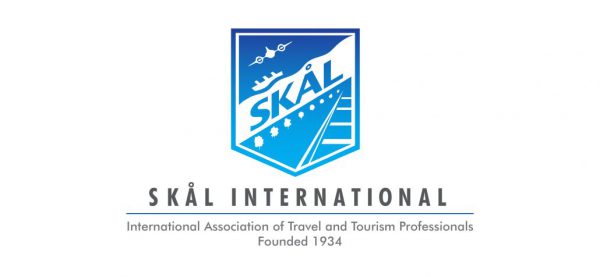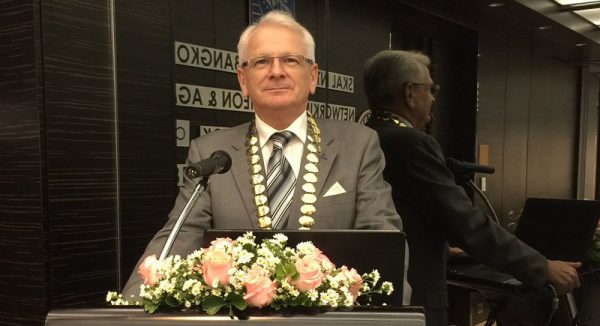CHIANG RAI, 3 July 2020: Nothing beats a good natter over a meal, with friends, sipping wine or quaffing beer. If you can throw in some networking into the mix, the recipe is perfect.
One of the oldest travel and hospitality tribes, Skal International, has an undeniably successful formula built on the ceremonies of copious toasts, and a club chant that expounds a merry camaraderie. At the same time, a smidgin of business networking discreetly creeps in on the sidelines.

Rarely missing a month the tribe of influential travel and hospitality company owners and top executives met in Bangkok until Covid-19 gate-crashed last March. Couldn’t even see the unwelcome guest but it wiped out Skal Club monthly toasting and back-slapping in one foul sweep.
Now Bangkok’s Skal Club is destined to be one of the first travel clubs in Southeast Asia to resume physical gatherings on 14 July. However, it will be limited to 60 people to get the social distancing ratio spot on. Meetings in Thailand are limited to a maximum of 100 people at present.
I can imagine the club president, Andrew Wood, rummaging through cupboards of his Bangkok condominium looking for his ‘Lord Mayor look-alike chain’ and perhaps calling out; “Where’s the Brasso polish?”

Every Skal Club president on their appointment receives the ceremonial chain, a tin of Brasso and instructions on how to keep it clean.
But the first Skal club lunch in four months will also adopt a serious tone as experts deliver presentations on the latest Covid-19 prognosis a topic that might cloud an otherwise a joyful reunion.
We are far from done with Covid-19, and it would be surprising if the Skal Club panel saw a short-cut route to recovery in the making. At a stretch, they might even be bold enough to suggest health officials, not the Ministry of tourism, are managing tourism these days. As long as the threat of a second wave is real, the government is not inclined to listen to the pleas of an industry that desperately needs to reopen the tourism floodgate.
At best, the panel could call for more clarity and perhaps a credible plan to show where we are heading. The daily media mill pumps out conflicting information giving us dizzy spells. Last week talk focused on limiting entry to just super wealthy tourists. This week, travel bubbles are currently being negotiated with nations in Asia. But our new tourism bosses at the Ministry of Health are talking about 200 visitors a day; 6,000 a month. Hardly worth the bother.
If the Ministry of Health is in charge, as it certainly looks like, does it have the nerve to lead us along a knife-edge ridge to safety with economic failure on one side and a health disaster on the other? Right now, no one has the answers. But time is running out. Travel companies that are household names will not see out this year without a cash injection. Many could close as early as September.
Some members may leave the Skal Club lunch happy that an old normal has survived. Others who have long memories might quietly hum that wartime ditty “pack up your troubles in your old kit bag and smile… what’s the use of worrying.”
That’s as close as it might get to the reassuring good old times that travel and hospitality bosses enjoyed for decades when attending a Skal Club lunch. “Raise your glasses and repeat the Skal Club toast…”
Meanwhile, at their travel offices just a few blocks away, anxious department managers bite their nails wondering how they are going to explain to staff the next round of redundancies and pay cuts. Job losses in Thailand could reach 7.5 million, representing a 20% unemployment rate, and tourism will be in the thick of that mess. The Tourism Council of Thailand estimates 2.6 million jobs in the industry are now at risk.
That’s the reality company owners face when they return from their chill-out lunch. Who gets them out of this almighty pickle?








Interesting and dangerous that one of the rules with the emergency decree was ignored at this meeting. Silly rules I think someone said. Nice to see meetings are slowly starting to happen again. Organisers must ensure the governments rules (laws) are strictly enforced. Rules such as social distancing, contacts recorded for everyone who attends and no one 70 years cannot be brushed off as silly rules. It was law signed under royal decree.
Thks Dr Bert for his observations. I have to agree it is very confusing out there. Even for my home country ?? UK there is so much contradictory information on what is allowed.
It’s fast moving and we are not keeping up. For us in Thailand event organisors are talking to each other and trying to make sense of it all. The latest is alcohol advertising in meetings – what is allowed what not?
As to age and attendance at events I’m not sure who can police that…does it include weddings…? Some ideas are just silly and hopefully they will be quickly forgotten.
Agree with the author, the biggest problem at this pre-recovery stage is the tsunami of conflicting information about the reopening of the country.
It would be great if a constructive critical panel could find / suggest a solution so that the MOTS, TAT, TCEB, THA, ATTA, etc., all communicate/coordinate the information, thus building the trust of both suppliers, buyers and, eventually, consumers around the world, by speaking the same language.
And that please not only in Thai like the latest TAT Webinar with all the Deputy Governors
Also as per the National Emergency Decree, “no elderly aged above 70 years old” are allowed to attend this kind of event, will those members and/or guests be able to attend on-line ?
Wishing all SKAL members ” bon appetite” and lots of food for thought.